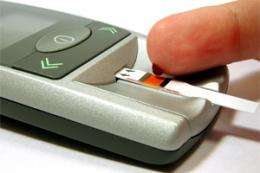For diabetics not on insulin, self-monitoring blood sugar has no benefit

For type 2 diabetics who are not on insulin, monitoring their blood sugar does little to control blood sugar levels over time and may not be worth the effort or expense, according to a new evidence review.
Self-monitoring blood sugar levels for type 1 diabetics and type 2 diabetics who require insulin is recognized as a critical part of self-care. For these insulin taking diabetics, keeping track of blood sugar levels helps them attempt to keep glucose levels within an acceptable range. However, it has been unclear if self-monitoring of blood sugar has the same value for type 2 diabetics who are not on insulin.
To answer this question, Uriëll L. Malanda of the VU University Medical Center in Amsterdam and his colleagues reviewed 12 studies, of more than 3,000 non-insulin-using diabetics. The review showed that self-monitoring of blood sugar by these patients had only a modest effect on a measure called HbA1c, a standard for assessing blood glucose control. Over a six-month period, patients who tested their own blood glucose levels reduced HbA1c by about 0.3 percent. This effect nearly completely dissipated after 12 months.
Additionally, the review showed that blood sugar self-monitoring had no effect on patients’ satisfaction, general well being, or general health-related quality of life. One study, which compared the cost of the first year of monitoring blood for glucose versus urine testing, found that monitoring blood glucose was 12 times more expensive.
The review appears in the latest issue of The Cochrane Library, a publication of The Cochrane Collection, an international organization that evaluates medical research.
Mayer Davidson, M.D., a professor of medicine at Charles Drew University in Los Angeles who authored one of the studies included in the review, notes that many endocrinologists recommend blood glucose self-monitoring as part of efforts to educate patients on the effect of lifestyle habits—for example, how eating an apple affects their blood glucose compared to drinking a glass of apple juice. However, knowing their blood sugar numbers doesn’t appear to change patients’ behavior.
“Patients aren’t using these numbers to do anything clinically significant,” he says.
With the cost of blood glucose test strips for home monitoring equipment hovering around 1 dollar apiece, he adds, there doesn’t appear to be enough “bang for the buck” to recommend that form of self-monitoring for most patients.
Authors of the review agree. “Regular self-monitoring of blood glucose in non-insulin treated patients has minimal impact on glycemic control, has no impact on general well-being or quality of life, and is rather expensive. Consequently, it does not add to a clinically relevant long-term benefit,” Malanda says.
More information: Malanda, U.L., et al. (2012). Self-monitoring of blood glucose in patients with type 2 diabetes mellitus who are not using insulin. The Cochrane Library, issue 1.














